冀教版七年级下册英语Lesson_35_Surfing_in_Sydney13
- 格式:docx
- 大小:17.70 KB
- 文档页数:5
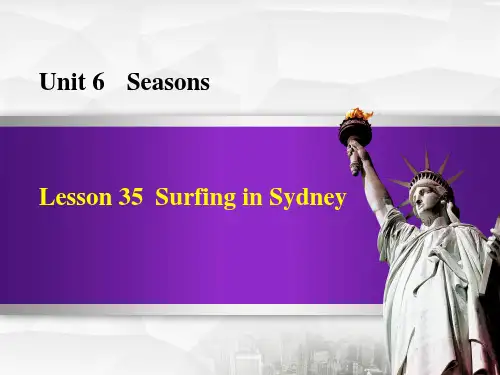
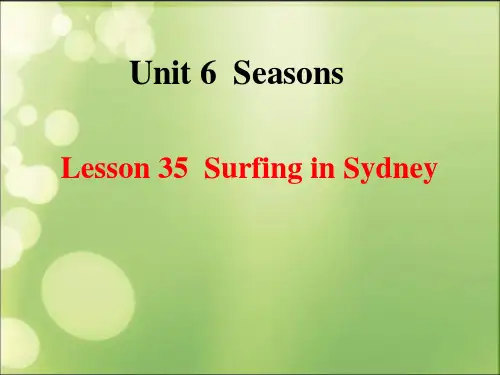
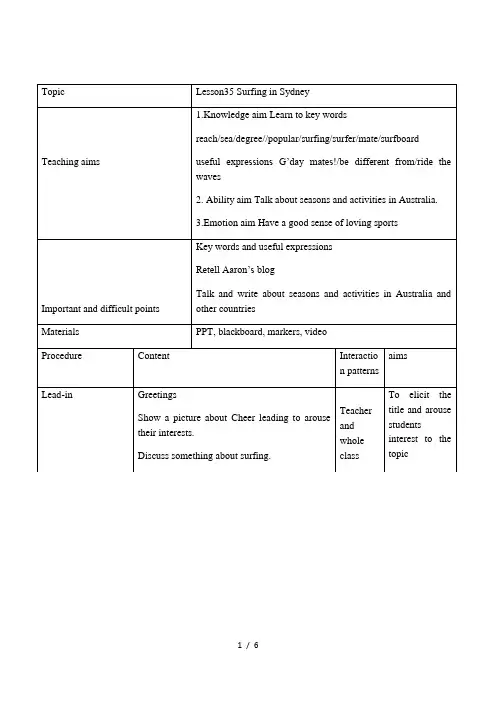
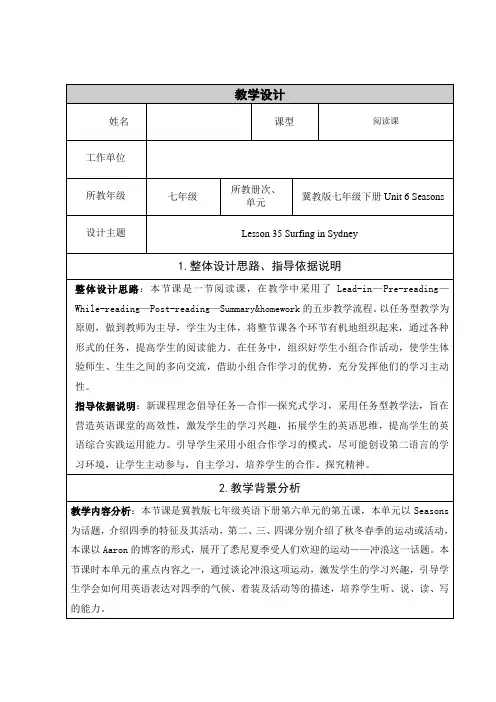
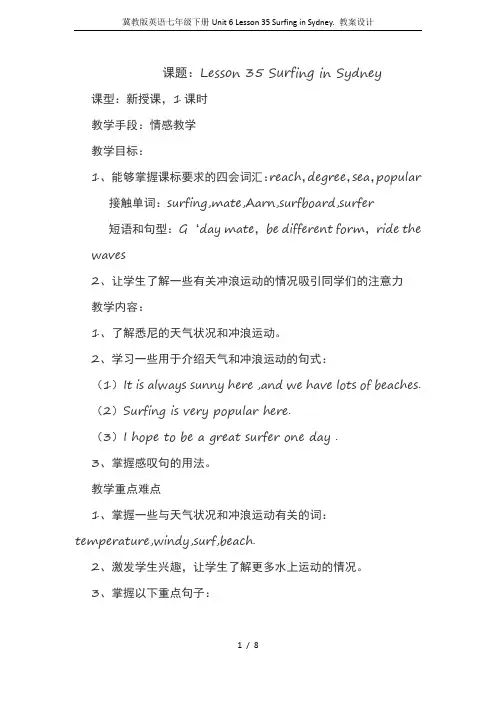
课题:Lesson 35 Surfing in Sydney课型:新授课,1课时教学手段:情感教学教学目标:1、能够掌握课标要求的四会词汇:reach,degree,sea,popular接触单词:surfing,mate,Aarn,surfboard,surfer短语和句型:G‘day mate,be different form,ride the waves2、让学生了解一些有关冲浪运动的情况吸引同学们的注意力教学内容:1、了解悉尼的天气状况和冲浪运动。
2、学习一些用于介绍天气和冲浪运动的句式:(1)It is always sunny here ,and we have lots of beaches.(2)Surfing is very popular here.(3)I hope to be a great surfer one day .3、掌握感叹句的用法。
教学重点难点1、掌握一些与天气状况和冲浪运动有关的词:temperature,windy,surf,beach.2、激发学生兴趣,让学生了解更多水上运动的情况。
3、掌握以下重点句子:(1)Seasons in Australia are different from seasons in many other countries.(2)Summers here go from December to February.(3)My mum and dad often come and watch me surf.教学思路本课主要介绍悉尼的夏天和冲浪运动。
在授课之前先让学生通过网络及其他途径了解悉尼的夏天的天气状况和冲浪运动。
课上可让学生通过小组合作的形式相互交流,在此基础上,教师通过多媒体向学生展示悉尼的夏天和冲浪运动的图片及视频,并让学生介绍自己的学习英语的感受。
教学背景本单元主要内容是描述季节和各种运动,前几课学生已经有了关于这方面的很多了解,所以学习本课对学生来说并不困难,谈到冲浪运动,会使学生感到很兴奋,提高学习积极性。
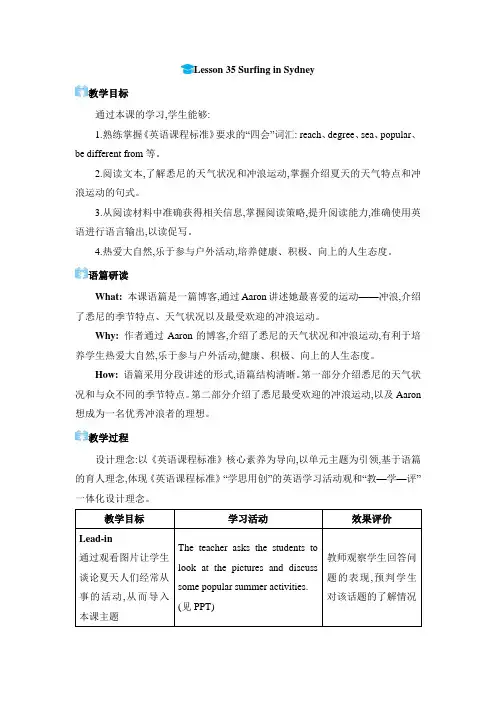
Lesson 35 Surfing in Sydney教学目标通过本课的学习,学生能够:1.熟练掌握《英语课程标准》要求的“四会”词汇: reach、degree、sea、popular、be different from等。
2.阅读文本,了解悉尼的天气状况和冲浪运动,掌握介绍夏天的天气特点和冲浪运动的句式。
3.从阅读材料中准确获得相关信息,掌握阅读策略,提升阅读能力,准确使用英语进行语言输出,以读促写。
4.热爱大自然,乐于参与户外活动,培养健康、积极、向上的人生态度。
语篇研读What: 本课语篇是一篇博客,通过Aaron讲述她最喜爱的运动——冲浪,介绍了悉尼的季节特点、天气状况以及最受欢迎的冲浪运动。
Why: 作者通过Aaron的博客,介绍了悉尼的天气状况和冲浪运动,有利于培养学生热爱大自然,乐于参与户外活动,健康、积极、向上的人生态度。
How:语篇采用分段讲述的形式,语篇结构清晰。
第一部分介绍悉尼的天气状况和与众不同的季节特点。
第二部分介绍了悉尼最受欢迎的冲浪运动,以及Aaron 想成为一名优秀冲浪者的理想。
教学过程设计理念:以《英语课程标准》核心素养为导向,以单元主题为引领,基于语篇的育人理念,体现《英语课程标准》“学思用创”的英语学习活动观和“教—学—评”一体化设计理念。
续表续表的情况设计意图对学生当堂课所学的内容进行过程性评价,达到“教—学—评”一体的学习效果【应用实践】Activity 7: Work in groups小组讨论,用本课所学内容描述自己喜欢的运动Work in groups. In your opinion,what is the most popular sport inChina? Can you play it in anyseason? Discuss and present youranswers to the class.教师观察学生是否能够完整地、顺利地进行语言输出。

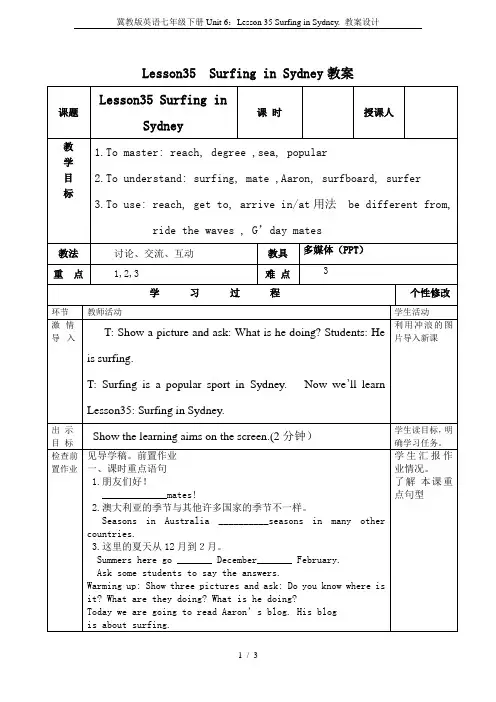
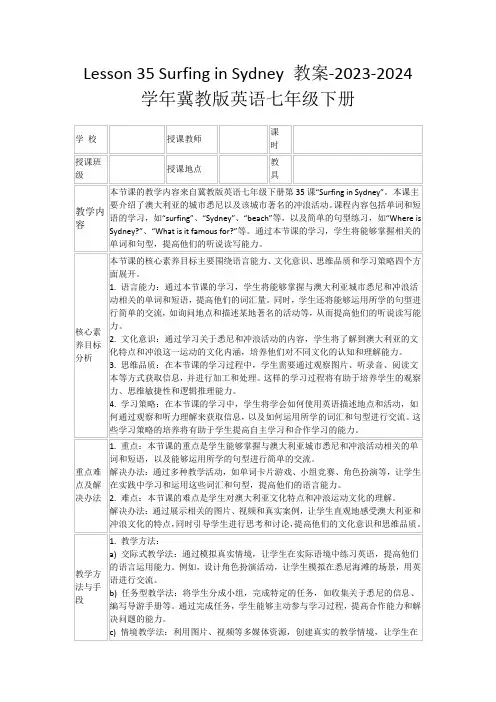
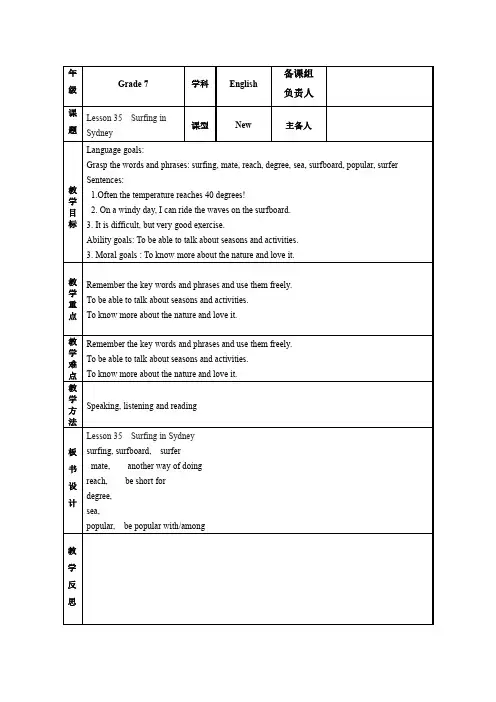
教师活动学生活动二次备课Step I:Lead inWhat's the weather like in summer in your hometown?What is the temperature in your hometown in summer ?What clothes do you wear during this season?Step II:Lead inWhat summer activities are popular among you and your friends?Step III:Lead inWhat else do you like doing during the season ?Today let ’s learn Aaron ’s blog.Can you guess what is his favourite season?What activity is he going to talk about?Step IV :ListeningListen and circle the correct words.1.Aaron is (16/18)years old.2.Aaron lives in (Canada/Australia).3.Aaron ’s favourite season is (winter/summer).4.Surfing (is/isn ’t)very popular in Sydney.5.Aaron ’s father (can/can ’t)get a good picture of him.Step V:Let’s Do It2.Match the words with correct meanings.Step VI:Let’s Do It4.Tick the correct meaning for each sentence.1.Summer is my favourite season.□I like summer best.□Summer is the best season.2.Surfing is very popular here.□Many people here like to go surfing.□Surfing is a famous sport.3.The weather in Beijing is different from the weather in Chengdu.□The weather in Beijing and Chengdu is not the same.Greet and talk about something about seasons.Watch the pictures and think about something about summer.Lead into the new lesson.Listen and circle the correct words.Learn the new words and match the words with correct meanings .Read the sentences and tick the correct meaning for each sentence.□The weather in Beijing and Chengdu is almost the same.Step VII:Reading tasks1.What does Sydney have?2.How is the weather?3.What’s the temperature here often?4.Are the seasons here the same as those in other countries?5.What is Aaron’s favourite season?6.What does Aaron think of the season?7.What can Aaron do on a windy day?8.What does Aaron think of surfing?9.Can his father take a good picture of him?Why not?10.What is Aaron’s dream for the future?11.What will he do to make his dream come ture? Step VIII:Language Point1.Surfing is very popular here.surfing n.冲浪运动surf v.冲浪surfer n.冲浪者popular adj.流行的;普及的be popular with/among在……中流行/受欢迎2.My mum and dad often come and watch me surf. watch sb.do sth.观看某人做某事(事情已经做过或常做)watch sb.doing sth.观看某人正在做某事(事情正在发生)I watched him leave,and then went home.I watched Jim playing basketball when I passed by yesterday.3.“G’day”is short for“Good day”and“mate”is another way of saying“friend.”be short for是……的简称/缩写another way of doing/to do sth.做某事的另外一种方式Step IX:Let’s Do It!Read the lesson and fill in the blanks with the phrases in the box.Read the text carefully and finish the reading task.Read the text and answer the questions.Listen,take notes and learn the new language points.Make sentences.Read the sentences and fill in the blanks with the phrases in the box.lots of beaches good exercise are different from a great surfer December to February 1.I live in Sydney,Australia.Wehave______________.2.Seasons in Australia______seasons in many other countries.3.Summers here go from_____________________.4.Surfing is very popular here.It is difficult,but very.5.I hope to be________________one day.Step X:Let’s Do It!Work in groups.In your opinion,what is the most popular sport in China?Can you play it in any season? Discuss and present your answers to the class.Step X:SummaryKey words&phrases:surfing,mate,reach,degree,sea,surfboard,popular, surferKey sentences:1.Often the temperature reaches40degrees!2.On a windy day,I can ride the waves on the surfboard.3.It is difficult,but very good exercise.To be able to talk about seasons and activities. HomeworkIn your opinion,what is the most popular sport in China?Can you play it in any season?Discuss and present your answers to the class.Work in groups and discuss the questions.Summary.。
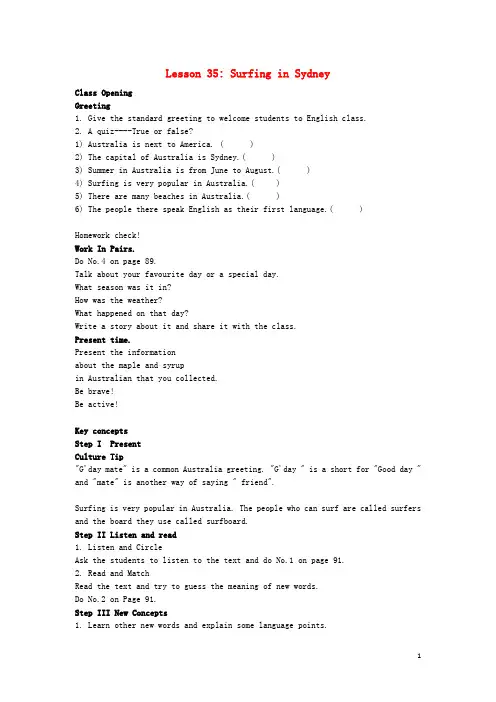
Lesson 35: Surfing in SydneyClass OpeningGreeting1. Give the standard greeting to welcome students to English class.2. A quiz----True or false?1) Australia is next to America. ( )2) The capital of Australia is Sydney.( )3) Summer in Australia is from June to August.( )4) Surfing is very popular in Australia.( )5) There are many beaches in Australia.( )6) The people there speak English as their first language.( )Homework check!Work In Pairs.Do No.4 on page 89.Talk about your favourite day or a special day.What season was it in?How was the weather?What happened on that day?Write a story about it and share it with the class.Present time.Present the informationabout the maple and syrupin Australian that you collected.Be brave!Be active!Key conceptsStep I PresentCulture Tip"G'day mate" is a common Australia greeting. "G'day " is a short for "Good day " and "mate" is another way of saying " friend".Surfing is very popular in Australia. The people who can surf are called surfers and the board they use called surfboard.Step II Listen and read1. Listen and CircleAsk the students to listen to the text and do No.1 on page 91.2. Read and MatchRead the text and try to guess the meaning of new words.Do No.2 on Page 91.Step III New Concepts1. Learn other new words and explain some language points.2 .Read and remember all the new words.Step IV Read and Act it outAsk the student to read the lesson.First by yourselves, then to your partner,finally volenteer to read it in front of the class.Do No.3 on page 91 by yourself.Step V. Work In Pairs.Work in Pairs--Do No.5 on page 91.First ask these questions in pairs:1.What is the most popular sport in China?2.Can you play it in any season?Then discuss and present your answers to the class.Survey and ReportDo a survey in a group of six.The question is:What is the most popular sport in China?You can report the result to your class like this:In our group, ______(数字)students like the _______(the name of the sport). So, most students like _____ (the name of the sport)in our group.Class ClosingHomework:1. Try to find more information about Australia on the Internet or from the books.2.Do No.4 on Page 91.3.Read the lesson and recite all the new words .。
教课基本信息课题Unit 6 Season Lesson 35 Surfing in Sydney课型新讲课年级七年级教课目标1.掌握单词 :surfing, mate, reach, surfboard, degree, sea, popular, surfer短语 :G’day mates, be different from , don ’ t have to, ride the waves, so many, etc.2.掌握和运用关于在澳大利亚冲浪的句型:3.掌握一般此刻时和惋惜句的用法。
4.掌握感官动词watch 的用法。
5.认识澳大利亚的天气特色和特有活动。
教课重难点1.正确使用本课的词和短语,分辨、会用 surfing, mate, reach, surfboard, degree, sea, popular, surfer, G’ day mates, be different from,don’ t have to, ride the waves, so many。
2.能使用一般此刻时和惋惜句。
3.掌握感官动词watch 的用法。
4.认识澳大利亚的天气特色和特有活动。
教学过程过程教学活动设计企图Step 1 Revision复习Lesson 34的要点单词,短语,和句型复习牢固已学过的知识 .Step 2 Lead in分组活动,让学生分组谈论澳大利亚依据学生们的地What do you know about Australia? It ’ s in the south of the earth.It has many beautiful beaches. People can surf in the sea.People can swim in the sea.We can go boating on the sea. People can play on the beach.S8:People can walk on the beach. 理知识 ,描述澳大利亚的天气特征和季节特色。
Lesson35 参考教案教学目标【目标语言】a. 掌握词汇及短语surfing; mate; Araon; reach; degree; sea; surfboard; popular; surfer; lots of; be different from; from… to…; a good picture of me; hope to do sth.; have tob. 句型1) G’day mates!2)Often, the temperature reaches 40 degrees!3) I don’t have to wear shoes!4) Surfing is very popular here.【能力目标】Enable students to write a blog..Enable students to introduce their popular sport.教学重难点To grasp the use of some words.教学步骤Step I Greeting and lead-inReview lesson 34 and lead in new lesson.T: Do you have a bog?S:….T: What will you write?Get students to talk about writing a blog on line.Step II Learn the textListen to the tape and finish exercise 1from“Let’s Do It”Step II Grasp some important phrases and sentences of the text. Phraseslots of 许多,大量= a lot ofbe different from 与……不同反义词组:the same as:与……一样from … to… 从……到…… a good picture of me 我的一张照片hope to do sth 希望做某事have to不得不(客观上,主观上用must) Sentences1) G’day mate!“G’day mate” is a common Australian greeting. “G’day” is short for “Good day” and “mate” is another way of saying “friend.” You try it!2)Often, the temperature reaches 40 degrees!reach v. 到达,走到;够…,抓…;n.手脚能够到的范围;范围,区域搭配:in reach 够得着out of reach 够不着reach get to arrive 区别:reach,是及物动词,后面从来不跟介词,直接跟宾语(地点名词)就行了。
UNIT 6 SeasonsLesson 35 Surf ing in Sydney教学目的1.Master the exclamatory sentence.2.Master new words and phrases.3.Talk about one’s favorite activity.教学重点Master new words and phrases.Use the sentence structure and phrases correctly.教学难点Can talk ab out one’s favorite activity in English.Make difference among wea r/put on / in.教学过程Step1:复习巩固、激情导入复习:提问Lesson34知识点1-6导入:Did you go to Sydney? What did you do in Sydney?Step2:出示目标、明确任务1.牢记本课黑体词汇:surfing, mate, Aaron, reach, degree, sea, surfboard, popular, surfer等;2.熟读课文,把握其意;3.背诵重点句子1-5,并灵活运用相关知识点。
Step3:自主学习、合作探究任务一:限时3分钟,熟读所有词汇,牢记黑体词汇任务二:熟读课文,把握其意,画出不理解处,同桌之间交流任务三:背诵重点句子,并自学知识点,画出不理解处,同桌之间交流1.My name is Aaron and I’m 16 years old.2.I don’t have to wear shoes!3.My dad likes to bring h is camera and take pictures of me.4.“G’day”is short for “Good day” and “mate” is another way of saying“friend”.5.The weather in Beijing and Chengdu is not the same.Step4:师生互动、展示提升互动一:单词记忆比赛互动二:课文熟读接力赛互动三:知识点展示大比拼知识点一:My name is Aaron and I’m 16 years old.我叫Aaron,我16岁。
冀教版七年级下册英语Lesson_35_Surfing_in_Sydney13
《Lesson 35 Surfing in Sydney》导学案
学校:安定区南鹰学校
主备人:董荷霞
学科:冀教版七年级下册英语第六单元
课题:《Lesson 35 Surfing in Sydney》
一.Learning Aims:
Study and master the words in this lesson
Master key phrases and sentences.
Read the text fluently.
Looking for and summarize points.
二.Learning difficult and important points:
1. Study and master the words in this lesson
2.Master the following sentences:
(1)It is sunny here, and we have lots of beaches.
(2)Surfing is very popular here.
(3)I hope to be a great surfer one day.
(4)Seasons in Australia are different from seasons in many other countries.
(5) My mum and dad often come and watch me surf.三.Learning Backgrounds:
本单元主要内容是描述季节和各种运动,前几课学生已经有了关于这方面的很多了解,所以学习本课——悉尼的夏天的天气状况和冲浪运动。
对学生来说并不困难,谈到冲浪运动,会使学生感到很兴奋,提高学习积极性。
Preparation:多媒体课件学生学案
Learning period:一课时
四.Learning Steps
Step1:Self-study
(一)、Pre-study
1.自学单词
2..熟读课文,把握其意,画出不理解处,小组之间交流,弄懂文意。
(二).Self-check
I.根据句意及首字母提示完成单词:
1)"G'day " is s______ for "good day"."Mate "is a______ way
of saying "friends".
2) S________ is very p_______ in Australia.
3) Surfing is very hard ,but it is good e________.
4) Would you like to b_______ your camera here ?We need it to take some photos.
Ⅱ. 句型展示
1. 气温经常达到40摄氏度!
Often, the temperature ______ 40 ______ !
2. 冲浪运动在这儿很受欢迎。
Surfing ______ very ______ here.
3. 我希望有一天能成为一名优秀的冲浪者。
I hope ______ ______ a great surfer one day.
Step2.Presentation
1.Listen and circle the correct words.(Let's Do It 1)
2. Reading
Skim the text, Meanwhile, Find out the main phrases and make sentences with them.
3. Show language points.
Work in groups to discuss the important language points.
(1).we have lots of beaches.
Lots of…许多的
=A lot of +n(pl) Beach----beaches(pl)
(2).My mum and dad often come and watch me.
Watch sb do sth.看见某人经常或已做某事。
Eg: He sat down and watched his son play the toy.
Watch sb doing sth.看见某人正在做某事。
Eg:I watched my sister doing her homework over there. (3).Surfing is very popular here.
动名词作主语,谓语动词用单三形式。
Eg: Running is good for your health.
(4).reach v. 到达;达到
◆Often, the temperature reaches 40 degrees!
气温经常达到40摄氏度!
◆When can you reach Hebei? 你何时能到达河北?
【探究总结】arrive/reach/get to的用法辨析
Step3.Consolidation
Write a short passage about one’s favorite activity in pairs. Step4.当堂检测
Ⅰ. 单项选择
1. Today the temperature will _______ 39 degrees.
A. reach
B. Get
C. Arrive
D. go
2. Seasons in China are _______ seasons in Australia.
A. same
B. the same as
C. different
D. different from
3. You can fly kites _______ a windy day.
A. on
B. At
C. In
D. during
4. In Australia surf ing is _______ than in China.
A. popular
B. Popularer
C. more popular
D. most popular
5. There are always _______ people on the square on weekends.
A. so much
B. so many
C. too many
D. too much
6.—What does “37°” mean?
—It means ______ ______.
7. When did you _______ home last night?
A.reach to
B. get to
C. reach
D. arrive in
8. I’ll call you as soon as my mother _______ Wuhan tomorrow.
A. get to
B. arrives in
II. 完成句子
1. 青岛有很多海滩。
There are ______ ______ ______ in Qingdao.
2. 冲浪是一种很好的运动,但是很难。
______ is ______ ______, but it is very difficult.
3. 篮球运动在中国很流行。
Basketball is very ______ ______ China.
4. 你会来看我冲浪吗?
Will you come and ______ me ______?
5. 我父亲拍了很多有关我的照片。
My father took many ______ ______ ______.
Step5. Summary
Sum up the main phrases and words
Step6. Homework.
(一).Preview lesson 36.
(二)Learn the following sentences by heart
1. The temperature reaches 40 degrees.
2. Seasons in Australia are different from seasons in many other countries.
3. Summers here go from December to February.
4. I don’t have to wear shoes.
5. My dad often watches me surf.
6. I hope to be a great surfer one day.。